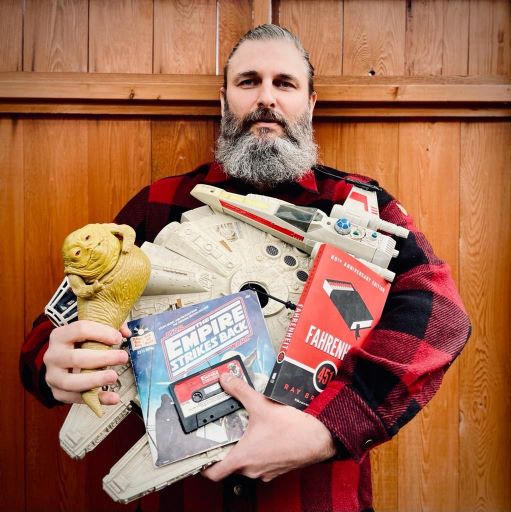
“Ready for dreamland” the attendant from Recall Industries says as she injects some kind of sleep serum into his neck. Black velcro straps hold his forearms to the chair. His head relaxes back into an electric halo, some kind of futuristic MRI machine.
He’s about to enter a state of schizoid embolism—only it isn’t Arnold Schwarzenegger, er, Douglas Quaid, strapped to that chair, and this is neither the 1990 film Total Recall nor Philip K. Dick’s “We Can Remember It for You Wholesale.” It’s me and this is now. And I’m trying to recall my earliest experiences with science fiction.
“Memory of a Lifetime… Recall… Recall…”
A cat’s claws extend as he playfully swipes at the toys on the bedroom side of the door. My mind’s eye struggles to picture which toys our tabby cat Tigger was pawing at that day—GoBots? Star Wars? Yellow Lego astronauts? I grew up in that 1980s synergy of toy products and animation when Saturday morning cartoons spilled out from the TV onto the carpet floor.
Another memory, another cat. This one is a large Himalayan named Twain. He’s obese, like Garfield after a dozen lasagnas obese. And he’s lying there on his side, his immense belly rising and falling with each lazy breath. I’m imagining he’s Jabba the Hutt, and instead of Princess Leia, a Barbie is tied to his paw.
It looks more like a scene from Rudolph the Red-Nosed Reindeer’s island of misfit toys than Hutt Palace, but that was my early sci-fi experience—a world of imagination where fantasy and sci-fi played and danced. Sci-fi represented a world where anything was possible, and in those early years, it was as much about my own freedom and imagination as it was about anything else. It was Calvinball. I made up the rules as the games were played.
And yet there were the cartoons and movies the toys were based on. It’s not clear which came first to me. They seemed to manifest simultaneously back then as they do now in my memory. If the toy-strewn bedroom floors represented the infinite possibilities of creating imaginary worlds, then the TV room, or living room as we un-ironically referred to it, represented a threshold into the unknown, an adult world of innocence versus experience.
“Memory of a Lifetime… Recall… Recall…”
The green Afghan. So many of my early sci-fi memories are inextricably tied to that knitted throw. If anything too PG was happening on the TV, my parents would throw that blanket over my head. Other times I’d pull it over my own head only to peek through the knit holes, secretly watching Luke and Leia kiss or hiding in terror from Jabba’s Rancor.
Many of my earliest memories were seen through the loose knitting in that throw blanket. It was a steady diet of classic reruns: the original Star Trek series, black and white Twilight Zone episodes, Buck Rogers in the 25th Century. And I remember as I got a bit older sitting there with my dad watching on our rented VCR player some of the more terrifying sci-fi stories, films like Alien, Enemy Mine, Predator, Dune, and Blade Runner.
Sci-fi became a part of my adolescent awakening. And while I continue to appreciate some imaginative characters and plots, I became increasingly interested in the allegorical aspects of sci-fi and the questions it raises about what it means to be human. Who are we? How did we get here? Where are we going? How will it end?
“Memory of a Lifetime… Recall… Recall…”
Years later, and I’ve taken over a middle school English class. We’re reading Fahrenheit 451. “It was a pleasure to burn.” That first line and that feeling on the back of my neck. That joy. And where has sci-fi been over the last couple of decades? Sure. I’d seen every Philip K. Dick adaptation. I’d waited overnight to get tickets for the opening night showing of the Star Wars prequels. But where had Ray Bradbury been all my life? What kind of sci-fi fan was I if I hadn’t read Bradbury?—or hadn’t read most of the classics? Why wasn’t I reading more sci-fi? And what do you do with questions like these?
You have conversations with a friend who shares your passion for speculative fiction (like a conversation about whether or not AI will lead to our immortality or extinction). The two of you start a sci-fi book club that later becomes a podcast. You keep trying to, as Bradbury said, “Stuff your eyes with wonder.”
— Chris Herzberg
Read Eric’s story here.